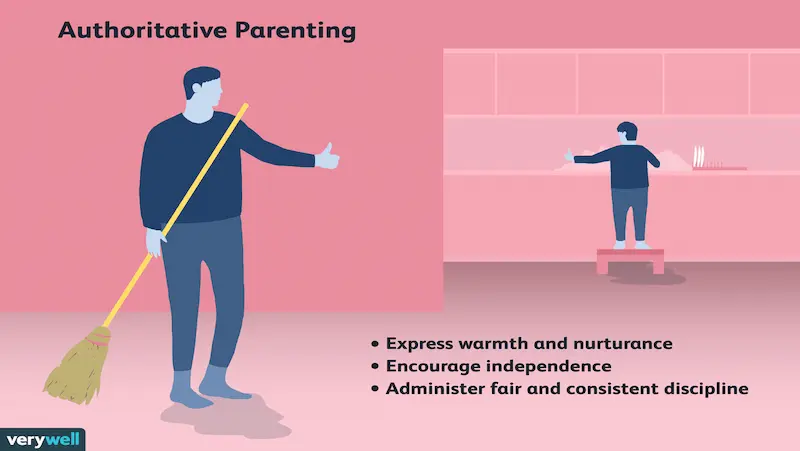Did you know that children laugh about 300 times a day, while adults only manage an average of 17 times? Laughter truly is the universal language of childhood! 😁
Parenting is a remarkable journey filled with laughter, challenges, and boundless love. As parents, we all strive to raise confident and responsible children who can confidently navigate the world around them. In this comprehensive guide, we will dive into the world of authoritative parenting, explore its definition, and characteristics, and delve into the myriad benefits it brings to your children’s development.
Table of contents
Introduction to Authoritative Parenting
At its heart, authoritative parenting is a balanced and nurturing approach that combines warmth with structure. It’s about setting clear boundaries while also fostering open communication and mutual respect. As authoritative parents, we create an environment where our children feel valued, understood, and supported.
This approach stands in contrast to authoritarian parenting, which leans heavily on strict rules without room for dialogue, and permissive parenting, which focuses on indulgence without clear guidelines.
Benefits of authoritative parenting:
Before we delve into the principles of authoritative parenting, let’s take a moment to appreciate the incredible benefits it offers for child development. Research consistently shows that children raised in an authoritative environment tend to develop higher self-esteem, better social skills, and a greater sense of independence. Moreover, they often exhibit improved academic performance, emotional regulation for kids, and resilience in the face of challenges.

Key Principles of Authoritative Parenting
At the heart of authoritative parenting lies a delicate balance between guidance and understanding. This approach emphasizes open dialogue, clear expectations, rational explanations, and a harmonious blend of discipline and warmth. By nurturing an environment of mutual respect and thoughtful communication, authoritative parents empower their children to grow into confident and responsible individuals.
1. Communication and Open Dialogue
Open communication is the cornerstone of authoritative parenting. Encouraging your child to express their thoughts, feelings, and concerns helps build a strong bond of trust. Regular heart-to-heart conversations create a safe space for them to share their experiences, fears, and dreams.
2. Setting Clear Expectations
Clear and consistent expectations guide your child’s behavior and help them understand the boundaries. When children know what is expected of them, they feel more secure and are more likely to make responsible choices.
3. Providing Reasoning and Rationality
Instead of resorting to “because I said so,” authoritative parents take the time to explain the reasons behind rules and decisions. This helps children develop critical thinking skills and a deeper understanding of the world around them.
4. Balancing Discipline and Warmth
Authoritative parents combine firmness with affection. Positive discipline is not about punishment, but rather about teaching valuable life lessons. The warmth in your approach assures your child that your guidance comes from a place of love and care.
Building a Strong Parent-Child Relationship
The bond between a parent and child is a tapestry woven with threads of love, trust, and shared experiences. Through active listening, encouraging autonomy, nurturing emotional intelligence, and quality bonding time, authoritative parents lay the foundation for an unbreakable connection. These moments of connection not only create cherished memories but also foster a sense of security and openness between parent and child.
1. Active Listening Techniques
Truly listening to your child shows that their thoughts and feelings matter. Practice active listening by maintaining eye contact, nodding, and summarizing their words. This simple act fosters empathy and encourages them to share more.
2. Encouraging Autonomy and Responsibility
Empower your child by involving them in decision-making processes. Allowing them to take on age-appropriate responsibilities nurtures their sense of autonomy and self-confidence.
3. Fostering Emotional Intelligence
Help your child identify and manage their emotions. Encourage them to express their feelings and provide guidance on handling different emotional situations.
4. Quality Time and Bonding Activities
Quality time with kids is a priceless gift. Engage in activities your child enjoys, whether it’s a board game, a nature walk, or baking cookies. These moments create lasting memories and strengthen your connection.

Effective Discipline Strategies
Discipline is a guiding light that shapes a child’s behavior and character. Authoritative parents employ strategies rooted in logical consequences, measured timeouts, collaborative problem-solving, and the development of self-regulation skills. By utilizing discipline as a tool for learning rather than punishment, children gain valuable insights into responsibility, accountability, and the art of making wise choices.
1. Logical Consequences
Link consequences to actions. If your child neglects their homework, a logical consequence might be reduced playtime. This approach helps them grasp the cause-and-effect relationship.
2. Time-Outs and Privilege Removal
Time-outs offer a chance for reflection, while removing privileges reinforces the importance of responsibility. Both methods teach your child about accountability.
3. Problem-Solving Approaches
Involve your child in finding solutions to conflicts. This empowers them to think critically and find constructive ways to resolve issues.
4. Teaching Self-Regulation
Guide your child in recognizing and managing their impulses. Breathing exercises, counting to ten, or a short break can help them regain control in challenging situations.
Handling Challenges and Misbehavior
Navigating the choppy waters of challenges and misbehavior is an inevitable part of parenting. Authoritative parents approach these moments with patience and empathy. They address power struggles through collaboration, tackle oppositional behavior with understanding, manage tantrums with calm, and empower children to resist negative peer pressure. This approach transforms challenges into opportunities for growth and learning.
1. Dealing with Power Struggles
Instead of engaging in power struggles, find ways to collaborate. Offer choices within acceptable limits to provide your child with a sense of control.
2. Addressing Oppositional Behavior
Approach opposition with empathy. Understand the underlying reasons for their behavior and work together to find solutions.
3. Managing Tantrums and Meltdowns
During tantrums, stay calm and patient. Provide comfort without giving in to unreasonable demands. Once your child has calmed down, discuss what triggered the tantrum and help them express their emotions.
4. Handling Peer Pressure
Equip your child with assertiveness skills to resist negative peer pressure. Teach them to say “no” while offering alternative suggestions.

Long-Term Impact of Authoritative Parenting
The seeds of authoritative parenting bear fruit that sustains throughout a child’s life. This approach not only fuels academic achievement and success but also cultivates emotional intelligence, social skills, and essential life abilities. The values instilled through authoritative parenting serve as a compass guiding children toward building healthy relationships, making informed decisions, and embracing the world with resilience and confidence.
1. Academic Achievement and Success
Children raised with authoritative parenting tend to excel academically. The confidence and problem-solving skills they develop contribute to their success in school and beyond.
2. Positive Social and Emotional Development
Authoritative parenting nurtures emotional intelligence and strong social skills. These qualities enable children to build meaningful relationships and thrive in various social settings.
3. Lifelong Skills for Healthy Relationships
The foundation of healthy relationships is laid in childhood. Authoritative parenting imparts lifelong skills like effective communication, empathy, and conflict resolution.
Conclusion
Mastering authoritative parenting is a journey of love, understanding, and growth—for both you and your child. By blending clear boundaries with open communication, you create an environment where your child can flourish into a confident, responsible, and compassionate individual.
As you embark on this remarkable adventure, remember that every giggle, every conversation, and every moment shared contributes to the remarkable story of your child’s life. Embrace the principles of authoritative parenting, and watch as your child blossoms into a remarkable and resilient individual ready to embrace the world with confidence and grace.
To get your hands on more educational and free resources on coding for kids, robotics for kids, financial education for kids, etc., do check out the BrightCHAMPS Page now!
Join the revolution in education with Brightchamps. Our courses in robotics, coding, and financial literacy empower kids to become confident and capable learners.
Frequently Asked Questions
A1. Authoritative parenting is a balanced approach that combines warmth and understanding with clear boundaries and expectations. Unlike authoritarian parenting, which is overly strict, or permissive parenting, which is overly lenient, authoritative parenting involves fostering open communication while maintaining consistent rules and guidance.
A2. Finding the right balance involves active listening, empathetic understanding, and providing logical explanations for rules. It’s about being firm yet supportive, ensuring that your child knows the reasons behind your decisions.
A3. Active listening, validating your child’s feelings, and using “I” statements to express your concerns are key strategies. Regular family meetings and open discussions can also enhance communication.
A4. When conflicts arise, focus on problem-solving rather than imposing control. Encourage your child to express their viewpoint and work together to find solutions that respect both perspectives.
A5. Absolutely! Authoritative parenting is flexible and can be tailored to suit your child’s age, temperament, and developmental stage. Adjust your approach while keeping the core principles of communication, understanding, and consistent guidance intact.


 We are an army of educators and passionate learners from BrightChamps family, committed to providing free learning resources to kids, parents & students.
We are an army of educators and passionate learners from BrightChamps family, committed to providing free learning resources to kids, parents & students.







